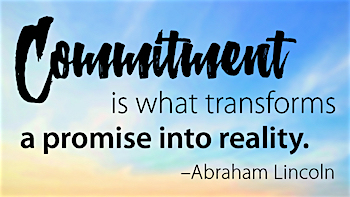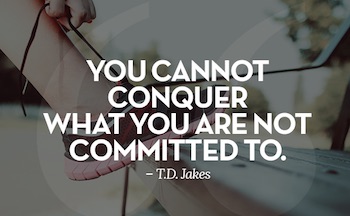Blog
Making A Commitment Is Better Than Having No Commitment
Author: Kathleen Nelson-Simley
Posted: Thursday - March 5, 2020
Have you ever made a commitment to someone or to something and then later you regretted making it? You probably had all kinds of reasons or excuses running through your head as to why you couldn’t keep the commitment. (Trust me! You're not alone. This has happened to me many times over!)
But, surprisingly, you found yourself still following through with the commitment anyway. Maybe you followed through because you didn’t want to let yourself or the other person down. Maybe you followed through because you wanted to be known as someone who does what they say they are going to do. Or, you followed through because you realized the commitment you made really was important to you.
Research shows that when we make a commitment to someone or something we are more likely to follow through with it than if we made no commitment at all. Commitments guide and influence our behaviors.

In other words, making a commitment is better than having no commitment.
The problem is that as kids move through the middle school years their commitments to not drinking, smoking or using other drugs begin to weaken or erode. Risky behaviors they were “never, never” going to do when they were in elementary school are now something they might “do someday” or “when they get older” or have already done.
This is why commitment-making is one of the most effective prevention strategies you can use to influence the attitudes and behaviors of your middle and high school students if you want to delay the onset of risky behaviors with them. It’s important for you to affirm commitments that are still strong, strengthen commitments that have weakened or make commitments where commitments no longer exist.
As we all know too well, it’s easy to make a commitment, but it’s a lot harder to keep it. So, you need to think about what it’s going to take to increase the likelihood the commitments your kids make for themselves are kept.
Here’s what research tells us…
If you want commitments made to be kept then you need to make commitments voluntarily. You are more likely to keep a commitment YOU wanted to make compared to making a commitment someone told you to make. Encourage your kids to make commitments they want to make for themselves even if they aren’t the commitments you want them to make.
The second condition important in helping commitments made to be kept is making sure they are personal. YOU need to write your commitments in your own words and say it the way you want to say it. This means that giving all kids the same drug-free pledge or commitments, written by someone else, don’t work. This “one size fits all” mentality assumes that one set of commitments works for all. Research shows this isn’t the case. Instead, let each of your students write their own personal commitments.
The last and third condition important for you to keep commitments you make is ensuring they are public. Once YOU make a commitment it’s important to share it with others who can support, remind and help you. Otherwise, it’s like the New Year’s resolutions we make to ourselves. It’s easy to not keep them if no one else knows we made them. This is why you need to make sure that when your kids make commitments they share them with others who are important to them and who can help and support them in keeping them.
Do these three conditions make sense to you in how they can help you keep a commitment you make? Can you think of a time in your life when you made a commitment and followed through with it because one or more of these conditions were met? I know I can.
The saying that “commitments are made to be broken” just isn’t true. Commitments are made to help us do what we want or need to do. It's true that commitments can be challenged and can be broken. But, when this happens, it’s not the end of the world. Sometimes this is when we learn some of life’s most important lessons and can re-commit with even more intention and determination.

So, don’t be afraid to ask your kids to make commitments for themselves when it comes to not engaging in risky behaviors in the future. It’s one of the best things you can do to help them do what THEY want to do.




